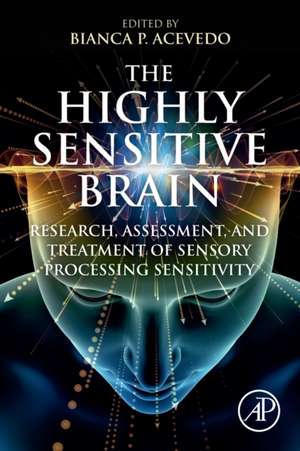The Highly Sensitive Brain: Research, Assessment, and Treatment of Sensory Processing Sensitivity
Editat de Bianca P. Acevedoen Limba Engleză Paperback – 20 mai 2020
and other species.
The Highly Sensitive Brain is a useful handbook and may be of special interest to clinicians, physicians, health-care workers, educators, and researchers.
- Presents a neurobiological perspective of sensory processing sensitivity (SPS)
- Provides assessment criteria and measurement tools for highly sensitive children and adults
- Discusses the health and social outcomes of being highly sensitive in children and adults
- Examines clinical issues related to high sensitivity
- Offers practical applications and a future vision for integrating high sensitivity in our society
Preț: 684.27 lei
Preț vechi: 898.19 lei
-24% Nou
Puncte Express: 1026
Preț estimativ în valută:
130.94€ • 140.01$ • 109.17£
130.94€ • 140.01$ • 109.17£
Carte tipărită la comandă
Livrare economică 10-24 aprilie
Livrare express 12-18 martie pentru 77.49 lei
Preluare comenzi: 021 569.72.76
Specificații
ISBN-13: 9780128182512
ISBN-10: 0128182512
Pagini: 222
Dimensiuni: 152 x 229 x 15 mm
Greutate: 0.3 kg
Editura: ELSEVIER SCIENCE
ISBN-10: 0128182512
Pagini: 222
Dimensiuni: 152 x 229 x 15 mm
Greutate: 0.3 kg
Editura: ELSEVIER SCIENCE
Public țintă
clinicians, physicians, health-care workers, educators, and researchersCuprins
1. The basics of sensory processing sensitivity
2. Assessment of sensory processing sensitivity across the lifespan
3. Sensory processing sensitivity—For better or for worse? Theory, evidence, and societal implications
4. Health and social outcomes in highly sensitive persons
5. Etiology of sensory processing sensitivity: Neurobiology, genes, and evolution
6. Clinical assessment of sensory processing sensitivity
7. Clinical characteristics of misophonia and its relation to sensory processing sensitivity: A critical analysis
8. The future of sensory processing sensitivity on planet
Earth and beyond
2. Assessment of sensory processing sensitivity across the lifespan
3. Sensory processing sensitivity—For better or for worse? Theory, evidence, and societal implications
4. Health and social outcomes in highly sensitive persons
5. Etiology of sensory processing sensitivity: Neurobiology, genes, and evolution
6. Clinical assessment of sensory processing sensitivity
7. Clinical characteristics of misophonia and its relation to sensory processing sensitivity: A critical analysis
8. The future of sensory processing sensitivity on planet
Earth and beyond
Recenzii
"This is a high-quality text regarding its description and summation of existing knowledge of SPS. The book does a thorough job of describing the biological basis of SPS, including genetic and epigenetic components. These objective measurements will likely help legitimize SPS as a normal variant of sensory processing. The addition of several scales for the assessment of SPS as well as the descriptions of clinical strengths and weaknesses of individuals are highly
useful. The book could benefit from more visuals, perhaps to aid in the understanding of the complex science that it discusses in some chapters. The book also does not have any color and can feel pedantic at times. Lastly, the book's final chapter, which discusses how SPS individuals may be helpful with off-world space missions - while interesting - seems out of place with the content of the rest of the book. Ultimately, the strengths of the book outweigh
its deficiencies. " --Doody
useful. The book could benefit from more visuals, perhaps to aid in the understanding of the complex science that it discusses in some chapters. The book also does not have any color and can feel pedantic at times. Lastly, the book's final chapter, which discusses how SPS individuals may be helpful with off-world space missions - while interesting - seems out of place with the content of the rest of the book. Ultimately, the strengths of the book outweigh
its deficiencies. " --Doody
